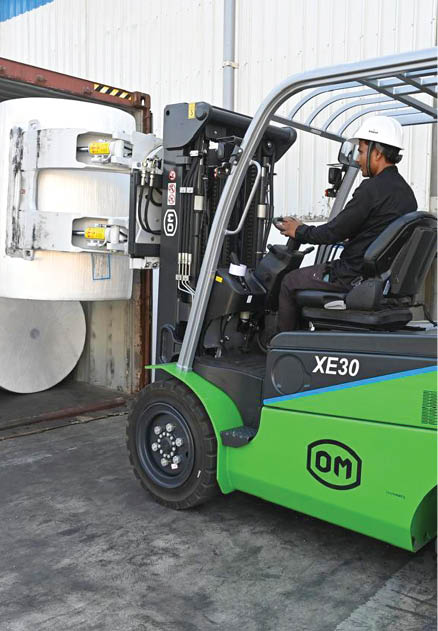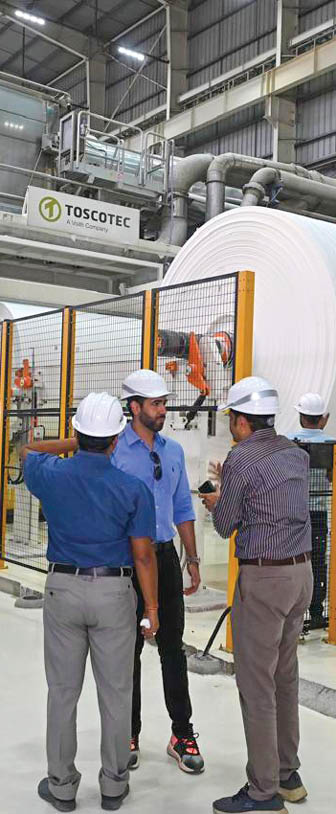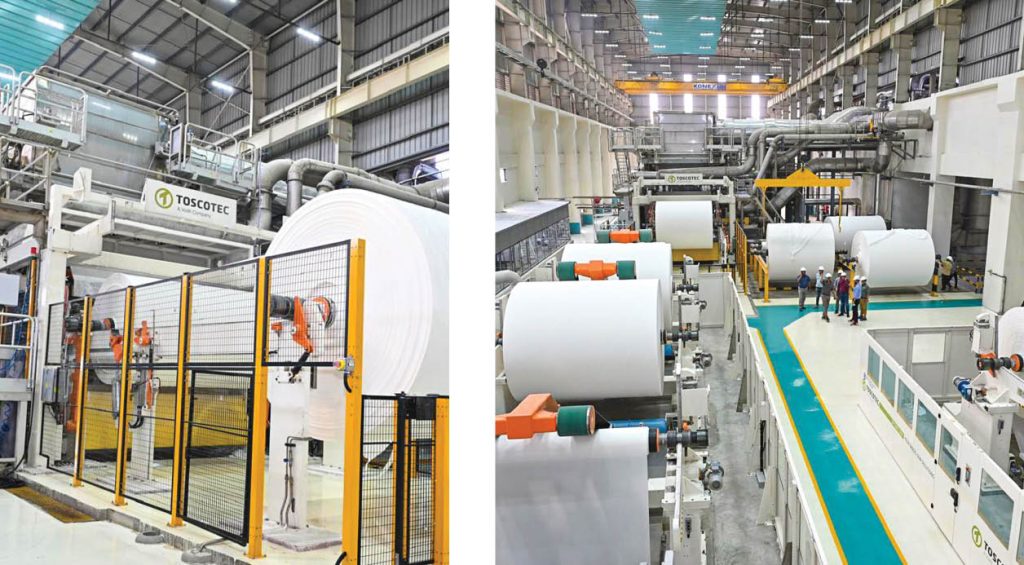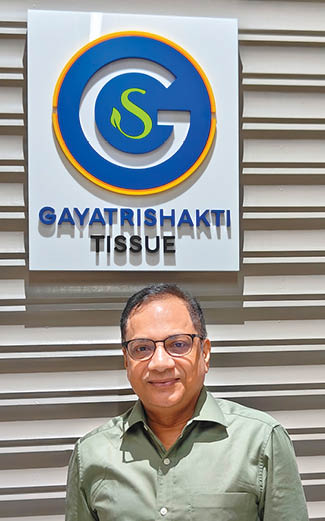Gayatrishakti Tissue Private Limited, a comparatively new entrant in the Indian tissue paper market, is making ripples with its 100 percent virgin, OBA-free tissue papers, made from responsibly sourced wood pulp. The company aims to continue delivering high quality tissue papers by incorporating eco-friendly practices into its sourcing and production processes. This was revealed by Mr. G. N. Agarwal, Managing Director of Gayatrishakti Paper & Boards Limited; Mr. Kiran Barad, Whole Time Director at Gayatrishakti Tissue Private Limited and Mr. Debojit Sengupta, Sales & Marketing Head, Gayatrishakti Tissue Private Limited during an exclusive interaction with Paper Mart.


Paper Mart: How would you describe the current market scenario for the tissue paper segment?

G.N. Agarwal: The global tissue paper market is experiencing significant growth, driven by factors such as increased hygiene awareness, urbanization, rising disposable income, shifting consumer preferences, growth in hospitality and healthcare sectors, and a shift towards sustainable products. With a heightened focus on hygiene and sanitation, especially post-pandemic, there has been a surge in demand for products like tissue paper, napkins and toilet paper. Consumers are now more concerned about cleanliness and personal care, leading to greater adoption of tissue paper products. As urbanization increases, there is a greater shift towards convenience-based products. Tissue papers are perceived as more hygienic and convenient, particularly in urban households and commercial spaces like offices, hotels, and restaurants.
Growing disposable income, particularly among the middle class, have resulted in higher spending on personal care products, including tissue paper. As people have more purchasing power, they opt for premium and more convenient hygiene products. Consumers are moving away from traditional cloth-based hygiene practices to disposable paper products, driven by their convenience and superior hygienic benefits.

The hospitality industry, including hotels and restaurants, along with hospitals and other healthcare facilities, has seen a significant growth in the demand for tissue paper products. These sectors require large volumes of disposable hygiene products for guests and patients. As global trends toward sustainability continue, consumers and manufacturers are focusing on eco-friendly tissue paper products made from recycled or sustainably sourced materials. The demand for sustainable products is growing, especially as environmental awareness rises in India.
The rapid growth of e-commerce platforms in India has made it easier for consumers to access and purchase tissue paper products. Online sales are growing in this sector, especially as more consumers turn to online shopping for everyday needs. The Government of India has implemented policies to improve hygiene standards, particularly in public spaces and institutions, which drives demand for disposable tissue paper products. Additionally, some regional government regulations mandate the use of hygienic and disposable products in public places.
Tissue papers are viewed as convenient for both home and on-the-go usage. With increasingly busy lifestyles, consumers prefer disposable, easy-to-use products for daily use, which fuels the demand for tissue papers. These factors collectively contribute to the rapid expansion of the tissue paper market in India, making it one of the fastest-growing segments within the broader paper and packaging industry. While recent industry challenges have impacted some companies, the overall market outlook remains favourable.

The global tissue paper market is experiencing significant growth, driven by factors such as increased hygiene awareness, urbanization, rising disposable income, shifting consumer preferences, growth in hospitality and healthcare sectors, and a shift towards sustainable products.
PM: Give background about your paper mill(s) catering to the tissue paper segment along with the production capacities.
GNA: Gayatrishakti Paper & Boards Limited has been a leader in coated duplex board and kraft liner. Taking the legacy forward, the company has installed a Toscotec AHEAD tissue paper machine with a sheet trim width of 2850 mm. Effective deckle for market size orders is 2800 mm. The machine has an operating speed of 1800 m/min and can produce over 35,000 TPA of 100 percent virgin, Optical Brightening Agent (OBA)-free tissue papers.
Watch: In Pursuit of Lesser Water Footprint
PM: What grades of tissue papers do you currently produce? Also mention their major applications.
Kiran Barad: We produce 100 percent virgin, OBA-free tissue papers from hard wood and soft wood pulp sourced from renowned producers. We manufacture tissue papers from 12.5 to 42 gsm in all grades of facial tissue, toilet/bath tissue, napkin/serviettes, kitchen towels and hand towels. All our tissue papers are FDA compliant, which makes them safe for both food and skin. Primarily, tissue papers are used to wipe the face and greasy or wet fingers, for personal and intimate care, and for surface wiping. We also produce industrial grade tissue papers like carrier tissue papers, which are used for wrapping fluff/pulp in diapers, underpads and sanitary napkins.

PM: Shed light on your market footprint with regard to domestic consumption and exports.

KB: Our main focus is on providing Indian domestic consumers with high-quality tissue papers to fulfil their daily hygiene needs. The Indian tissue paper industry is seeing tremendous growth and our present volume is likely to be consumed to a greater extent domestically in near future. However, our strategic location near the port makes export a viable option too.
PM: What unique features or innovations set your tissue paper products and production processes apart from competitors?
Debojit Sengupta: Our Toscotec AHEAD tissue machine features first-class drying configuration including an upgraded design shoe press TT NextPress, a third-generation design TT SYD Steel Yankee Dryer and a high-efficiency TT Hood. It has Toscotec’s patented TT SAF® DD (Short Approach Flow System with Double Dilution) for superior energy efficiency & TT Brain DCS of upgraded design. This superior technology helps us to produce tissue papers with high bulk and ultra softness. We have also installed two OPTIMA 2200 slitter rewinders, which can slit reels from 130 mm to 2800 mm, helping us to cater to the need of wide range of converters with customized sizes.

Gayatrishakti Paper & Boards’ main focus is to provide Indian domestic consumers with high-quality tissue papers to fulfil their daily hygiene needs, while incorporating eco-friendly practices into its sourcing and production processes.
PM: How do you incorporate sustainability or eco-friendly practices into your production process?
DS: Our focus is on delivering tissue papers of highest quality by incorporating eco-friendly practices into our sourcing and production processes. We are an FSC certified company procuring pulp from sustainable, responsible & certified sources.
We have installed a state of the art Zero Liquid Discharge (ZLD) Plant. The system consists of Non chemical based effluent treatment plant (ETP) and recycling plant with latest fully automatic MBR technology based biological treatment, multistage reverse osmosis system, Multi Effect Evaporator with Air Thin Film Dryer. This plant is an advanced wastewater treatment system designed to minimize or eliminate the discharge of liquid waste from industrial processes, recovering water and concentrating contaminants as solid waste for disposal or reuse. ZLD plant aim to recover almost 100% of wastewater for reuse and minimal water wastage thereby ensuring a sustainable and environmental friendly approach.
GSTPL has installed Waste to Energy (WTE) boiler by using waste & ETP sludge generated from sister concern units as a fuel. The Concept is to save the fossils fuel and promote the waste utilization for sustainability.
Also Read: Jani Sales Expanding Global Footprint to Fulfil Premium Tissue Paper Demands
PM: How do you envision the future demand and opportunities for tissue paper evolving in light of sustainability and hygiene trends?
DS: Future growth will be driven by sustainability and hygiene needs. Companies will invest in energy-efficient processes and water conservation to meet stricter environmental regulations. The tissue paper industry will see increased demand, but success will depend on sustainable innovations, regulatory compliance and catering to evolving hygiene-conscious consumer behaviours.



